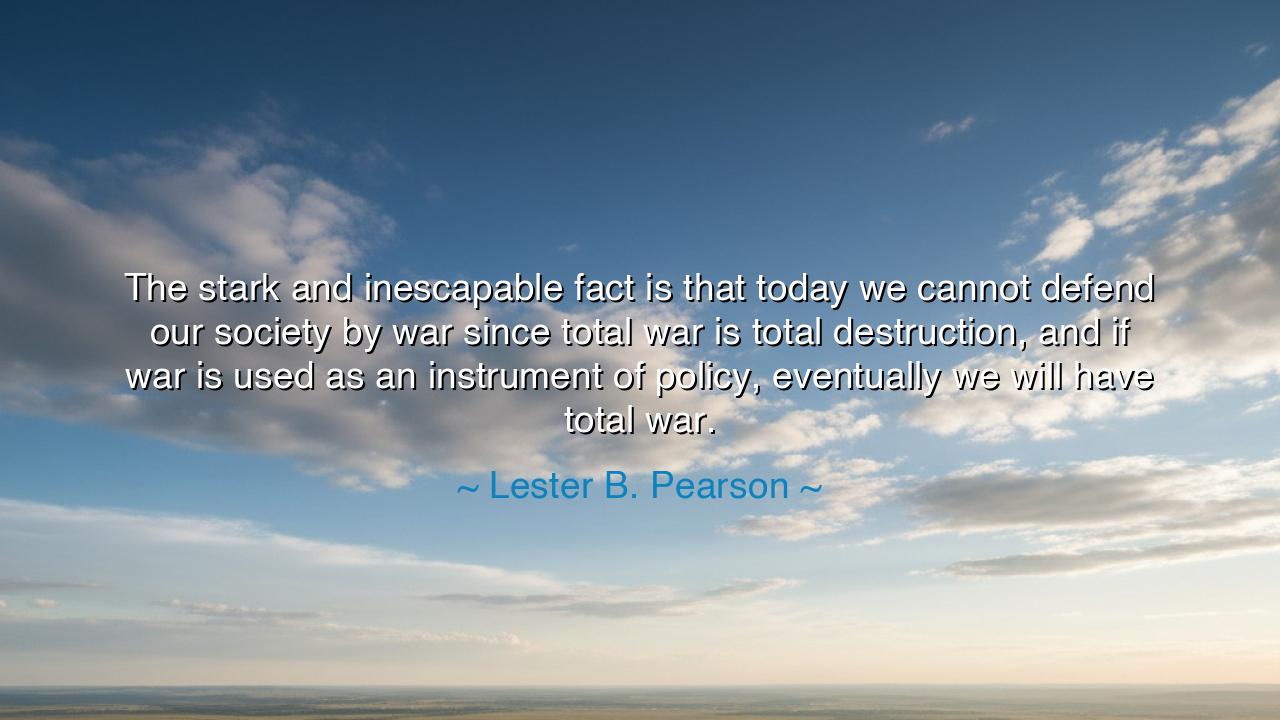
The stark and inescapable fact is that today we cannot defend our
The stark and inescapable fact is that today we cannot defend our society by war since total war is total destruction, and if war is used as an instrument of policy, eventually we will have total war.






Hear the voice of Lester B. Pearson, a man who lived through the terrors of the twentieth century and rose to guide nations with the wisdom of peace. He declared: “The stark and inescapable fact is that today we cannot defend our society by war since total war is total destruction, and if war is used as an instrument of policy, eventually we will have total war.” These words were not born in the quiet of theory but in the shadow of mushroom clouds, when humanity first realized that its weapons could annihilate all life.
The meaning is grim yet full of warning. In ages past, war was seen as the tool of kings, a way to expand borders, to punish enemies, to enforce policy. But in Pearson’s time—after the atomic bomb fell on Hiroshima and Nagasaki—the very nature of war had changed. No longer limited to armies clashing on battlefields, total war now meant the destruction of cities, of nations, of civilization itself. Thus, Pearson spoke the truth: society cannot be defended by weapons that destroy the very fabric of society. A house cannot be protected by fire if the fire consumes the house itself.
History proves his words. In the First and Second World Wars, the world learned the meaning of “total war.” Civilians were no longer safe behind walls, for bombs fell from the skies. Economies were bent entirely to the will of the battlefield, and propaganda shaped the hearts of nations. By the end of 1945, tens of millions were dead, and the weapons of man had reached a scale where victory was indistinguishable from ruin. The victors stood among ashes, and the defeated lay in rubble. It was then, in this aftermath, that Pearson and others declared: we must not walk this road again.
Consider also the Cold War that followed. Two great powers, armed with nuclear arsenals capable of ending life on earth, stood in opposition. Their leaders spoke often of defense, but every step toward war was a step toward annihilation. The Cuban Missile Crisis revealed how close humanity could come to destruction through miscalculation and pride. It was not victory in battle but restraint, negotiation, and the willingness to step back from the abyss that preserved society. Pearson’s wisdom was vindicated: to use war as policy in the nuclear age is to invite the end of all.
The lesson is not only for nations, but for all who wield power. The tools of destruction—whether weapons, words, or policies—may appear strong, but if they consume what they claim to defend, they are folly. A leader who believes he can preserve justice through violence, or protect peace through the sword, risks destroying the very treasures he seeks to guard. True defense lies not in escalation, but in dialogue, in cooperation, in the building of institutions that resolve conflict before it bursts into flame.
The teaching, O seeker, is this: when the weapons of man grow so terrible that their use ensures mutual ruin, then war must be abandoned as a means of policy. The survival of society depends on courage—not the courage to fight, but the courage to restrain, to speak, to compromise. To wage peace is harder than to wage war, for it requires patience and humility. But it is the only path that leads away from destruction and toward the flourishing of nations.
Therefore, take this wisdom into practice: honor peacemakers, not warmongers; support leaders who pursue negotiation, not escalation; and in your own life, resolve conflict through dialogue rather than violence. For the seeds of peace are sown not only by nations but by individuals. If every man and woman chooses reconciliation over destruction, the world itself may be preserved.
So let the words of Lester B. Pearson endure: “We cannot defend our society by war since total war is total destruction.” Let them remind us that the fate of civilization rests not in weapons, but in wisdom, not in power, but in restraint. To embrace this truth is to ensure that the future belongs not to ashes, but to life, to justice, and to peace everlasting.






AAdministratorAdministrator
Welcome, honored guests. Please leave a comment, we will respond soon